Fire Warms the Northern Lands -- A Prussian AAR
- Thread starter Rensslaer
- Start date
-
We have updated our Community Code of Conduct. Please read through the new rules for the forum that are an integral part of Paradox Interactive’s User Agreement.
You are using an out of date browser. It may not display this or other websites correctly.
You should upgrade or use an alternative browser.
You should upgrade or use an alternative browser.
sorry, could not resist
in the US, we spell it
that said, wonderful AAR ! ! !
BBBD said:Rensslaer one word
WUNDERBAR!
in the US, we spell it
WONDERBRA ! :rofl:
that said, wonderful AAR ! ! !
Last edited:
Ringelnatz, I've gotten to play with this a little bit. I had in the past, but never really took the time to figure out why tariffs didn't seem to work.Ringelnatz said:Is there a reason that you dont raise the tariffs? That would be an income boost...
My problem is that every time I tried tariffs the money would come in strong at first, then die to almost nothing. I always figured that my tariffs were so stressing the pops out that they couldn't afford to buy things anymore.
As an alternative to that hypothesis, I wonder if it's possibly due to the fact that Prussia has such an empire that it doesn't require much in the way of imports. I've directed Prussia's conquests in such a way that most of what we need, it is produced domestically. I never wanted to have to rely on trade to get these things, because I despaired that Prussia would ever have sufficient prestige to get first dibs.
Something to think about, anyway. Not sure if this makes any sense, but every time I've tried using tariffs the revenue goes away very quickly.
Rensslaer
Tariff revenue is quite susceptible to imbalance and fluctuation. The fluctuation also seems to always be of the downward variety, except in the cases when you sell off a large stockpile of non-consumable goods. Then you see a spike, then it goes back down to normal. Selling off a stockpile of consumable goods might actually decrease your tariff revenue. In any case, it won't be nearly as effective as selling off non-consumable goods.
My experiences, though. Haven't played 1.03c extensively, so I can't speak for that version.
Anyways, taxes are better. More predictable, so you can plan ahead for stuff, and less of a burden on your POPs.
My experiences, though. Haven't played 1.03c extensively, so I can't speak for that version.
Anyways, taxes are better. More predictable, so you can plan ahead for stuff, and less of a burden on your POPs.
From The Eagle Rising: The Story of Prussia's Arrival On the World Stage, pub. 1989 by Professor Reinicke Herz
On April 2nd, 1868, the British Royal Navy landed 6 divisions of infantry, under the command of General Archer Lewis, on the German coast at Stade, then part of the North German Federation, an ally of Prussia. They immediately began marching toward the strategic industrial city of Bremen.
As soon as word reached Kermit von Unruh, then acting as War Minister in von Moltke’s place, he recognized it as a vastly threatening operation, and issued orders for coastal defenses to respond.
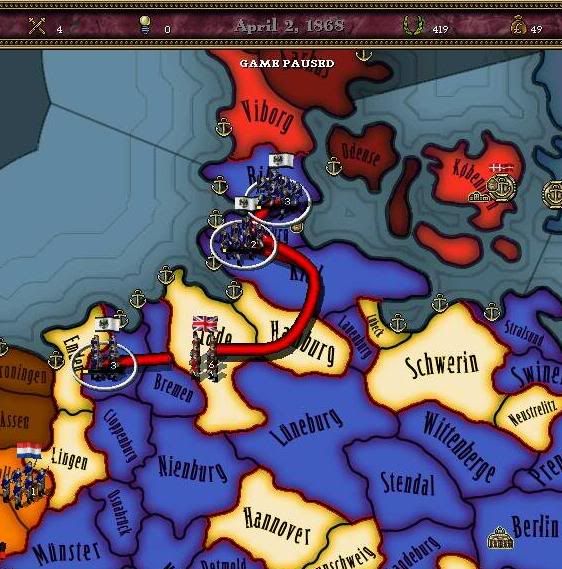
The Battle of Bremen was joined on April 27th, which began a long and bloody campaign of attrition. By the end of May, Bremen had been reinforced, and Lewis’ early advantage in numbers was cut to equivalency with the Prussian defenders. By June, General Greifswald had arrived with yet more reinforcements, and the battle was decided. The remnants of six British divisions surrendered on July 1st.
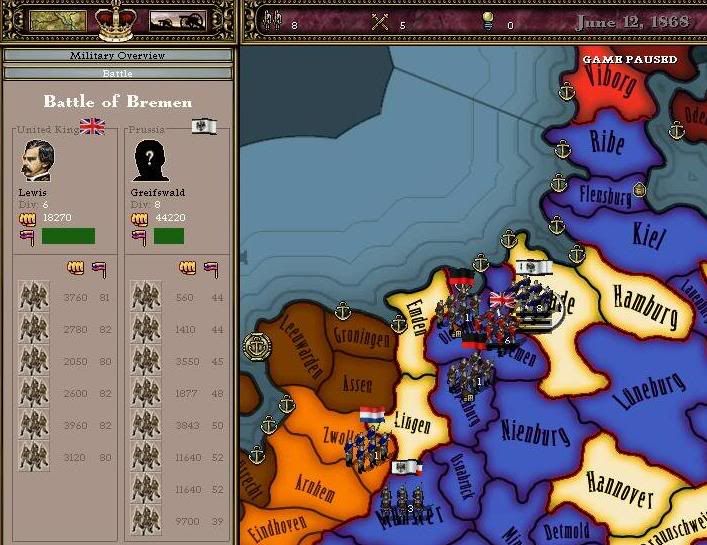
But the British were persistent, this time. As they lost their overseas colonies, it became apparent to their leadership that they must crush the Prussian homeland, and soon. In August, another four divisions were landed at Hamburg.
Defending Prussian divisions arrayed themselves near Luneburg, then attempted briefly to dislodge the British from Hamburg. The attack proved pointless, and the Prussians retreated. As three British divisions surged north toward Kiel, another 10 divisions sailed into harbor to ensure the permanence of Royal authority on this shore.
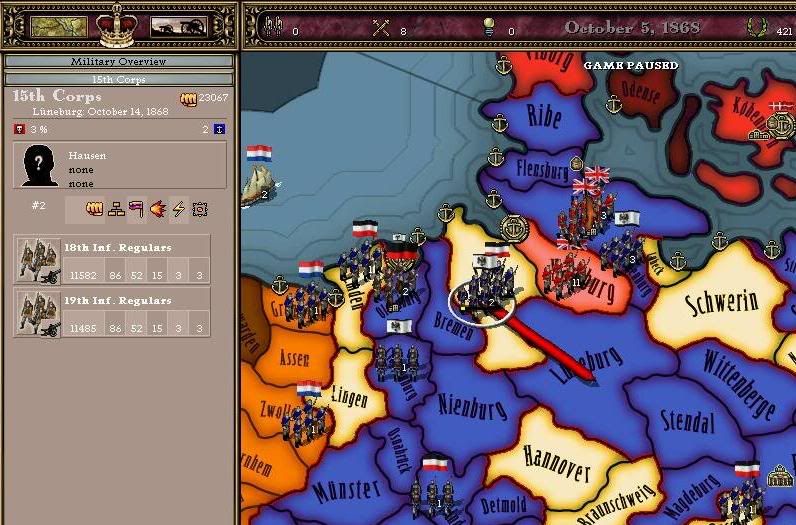
During this time, encouraged by the British landings and knowing that it might be their final chance at regaining independence, Catholic partisans in southern Germany revolted. They underestimated, however, the resolve of the Habsburgs to support them. Not wanting to rejoin the war, Emperor Franz Josef simply allowed the rebels to disrupt his enemy’s rear areas, in hopes that the British would sufficiently weaken Prussia for Austria to force a comeback.
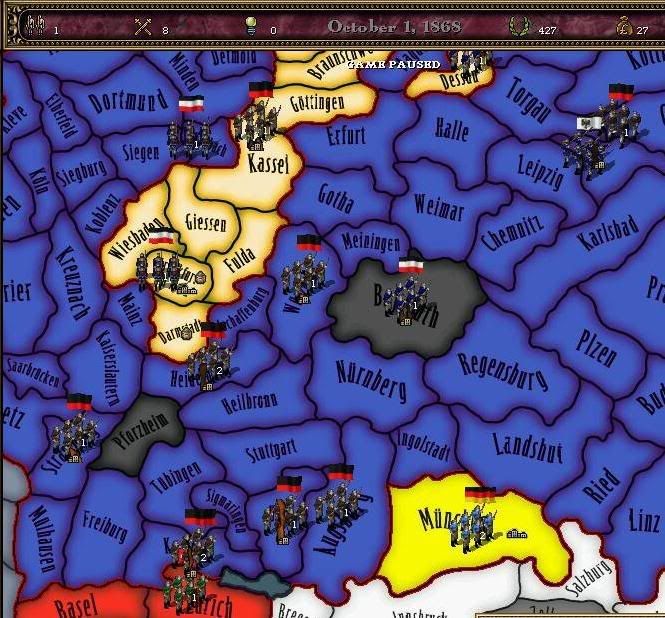
Feldmarschall Manteuffel, returning to the defense of the Fatherland from the battlefields of France, was forced to delay his armies’ urgent ride to oppose these strong and numerous insurrections. The rebellions flared brightly in intensity, but by the end of the year the south fell quiet once more.
Events in the north, however, developed with breathtaking rapidity. Oldenburg and Cloppenburg, two of the more independent provinces of the north, began a pattern of sporadic rebellions, which complicated the Prussian defense. Meanwhile, the British pressed their forces south, attacking first at Lauenburg, and in more substantial strength at Luneburg in November. General Clifford Powell’s nearly 4:1 advantage forced the Prussians to withdraw to a more defensible position. Smaller forces assaulted Stade and Lubeck. And while the Royal Navy frustrated Prussian attempts to reinforce the north by sea, the British used their naval superiority to effect a powerful secondary invasion at Swinemunde.
It was then that Kaiser Wilhelm, and Ministers Roon, Unruh and Rensselaer began a frantic effort to ensure the security of the Prussian capital from the overwhelming onrush of British soldiers.
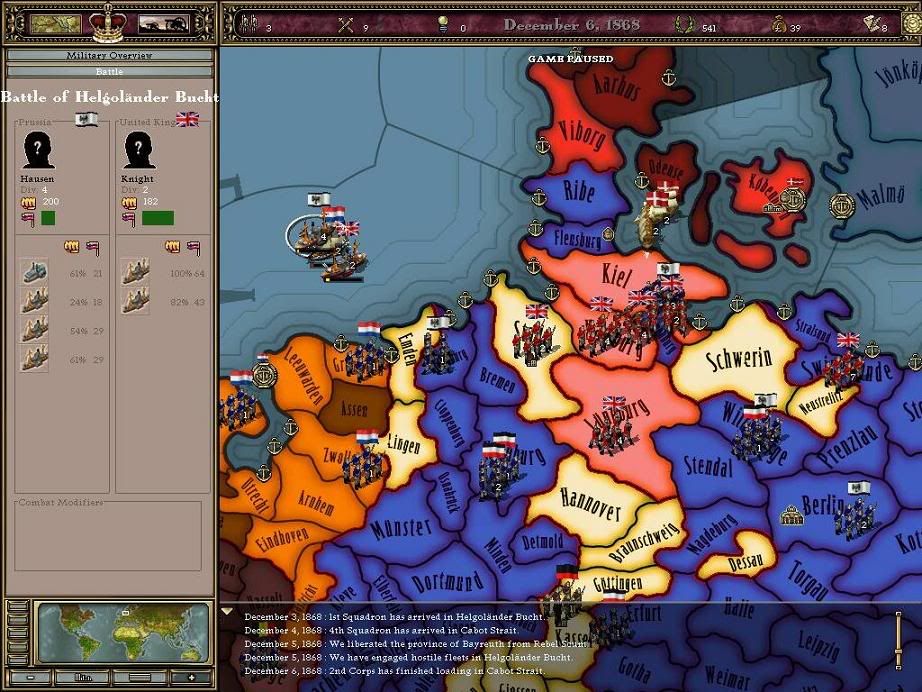
On April 2nd, 1868, the British Royal Navy landed 6 divisions of infantry, under the command of General Archer Lewis, on the German coast at Stade, then part of the North German Federation, an ally of Prussia. They immediately began marching toward the strategic industrial city of Bremen.
As soon as word reached Kermit von Unruh, then acting as War Minister in von Moltke’s place, he recognized it as a vastly threatening operation, and issued orders for coastal defenses to respond.

The Battle of Bremen was joined on April 27th, which began a long and bloody campaign of attrition. By the end of May, Bremen had been reinforced, and Lewis’ early advantage in numbers was cut to equivalency with the Prussian defenders. By June, General Greifswald had arrived with yet more reinforcements, and the battle was decided. The remnants of six British divisions surrendered on July 1st.

But the British were persistent, this time. As they lost their overseas colonies, it became apparent to their leadership that they must crush the Prussian homeland, and soon. In August, another four divisions were landed at Hamburg.
Defending Prussian divisions arrayed themselves near Luneburg, then attempted briefly to dislodge the British from Hamburg. The attack proved pointless, and the Prussians retreated. As three British divisions surged north toward Kiel, another 10 divisions sailed into harbor to ensure the permanence of Royal authority on this shore.

During this time, encouraged by the British landings and knowing that it might be their final chance at regaining independence, Catholic partisans in southern Germany revolted. They underestimated, however, the resolve of the Habsburgs to support them. Not wanting to rejoin the war, Emperor Franz Josef simply allowed the rebels to disrupt his enemy’s rear areas, in hopes that the British would sufficiently weaken Prussia for Austria to force a comeback.

Feldmarschall Manteuffel, returning to the defense of the Fatherland from the battlefields of France, was forced to delay his armies’ urgent ride to oppose these strong and numerous insurrections. The rebellions flared brightly in intensity, but by the end of the year the south fell quiet once more.
Events in the north, however, developed with breathtaking rapidity. Oldenburg and Cloppenburg, two of the more independent provinces of the north, began a pattern of sporadic rebellions, which complicated the Prussian defense. Meanwhile, the British pressed their forces south, attacking first at Lauenburg, and in more substantial strength at Luneburg in November. General Clifford Powell’s nearly 4:1 advantage forced the Prussians to withdraw to a more defensible position. Smaller forces assaulted Stade and Lubeck. And while the Royal Navy frustrated Prussian attempts to reinforce the north by sea, the British used their naval superiority to effect a powerful secondary invasion at Swinemunde.
It was then that Kaiser Wilhelm, and Ministers Roon, Unruh and Rensselaer began a frantic effort to ensure the security of the Prussian capital from the overwhelming onrush of British soldiers.

HELP THE BRITISH ARE COMING, THE BRITISH ARE COMING!
Hope you haven't bit of more than you can chew old man, by the way this is one of the AAR's that has inspired me to get the game. So be prepared for thousands of newbie questions!
Hope you haven't bit of more than you can chew old man, by the way this is one of the AAR's that has inspired me to get the game. So be prepared for thousands of newbie questions!
This whole 'North German Federation' is confusing me. I thought that all of Germany was united under Prussia's benevolent rule! 
Well, it's happened before in this AAR! If you'll recall my 1858 war with France, they nearly had me fried, and I began worrying about the security of Berlin, before I was barely able to turn them away. We shall see...BBBD said:HELP THE BRITISH ARE COMING, THE BRITISH ARE COMING!
Hope you haven't bit of more than you can chew old man,
Coolness! I'm really glad to hear that! You'll really enjoy this. I'm not certain if I'll do another Vicky game after this (I'll do more Vicky, just perhaps not right away) or if I'll try EU II for a change of pace. I've been itching to do a Colonial/Constitutional USA game.BBBD said:by the way this is one of the AAR's that has inspired me to get the game. So be prepared for thousands of newbie questions!
In my game, in 1862, a coalition of pro-Prussian German minors formed the North German Federation, but Prussia did not join. They became a satellite of Prussia. But at the same time, some pro-Austrian minors formed the South German Federation, also independent but satellited.anonymous4401 said:This whole 'North German Federation' is confusing me. I thought that all of Germany was united under Prussia's benevolent rule!
I'm not particularly concerned with forming a united Germany. If it happens, it happens. I first hit Paris before I first hit Vienna, so did not trigger the unification events. I have said before that if I do finally hit Paris in the wake of my conquest of Austria, then I reserve the right to trigger those events (presuming they don't trigger automatically even though I've taken a roundabout route). Again, we shall see...
Even though I am assured of ultimate Prussian victory, I still fear the damage the British might do. They must be stopped!
Rensslaer said:...And while the Royal Navy frustrated Prussian attempts to reinforce the north by sea, the British used their naval superiority to effect a powerful secondary invasion at Swinemunde...
while it is too late to implement it in this AAR, what would be the effect of accepting satellite status with England?
while it would then be nice to DOW France (thence form Germany [which would remove the satellite status? :wacko: ]), IIRC as a satellite you cannot DOW...
as always, killer update! ! !
From The Eagle Rising: The Story of Prussia's Arrival On the World Stage, pub. 1989 by Professor Reinicke Herz
At the beginning of October, 1868, a flurry of confusion confounded Feldmarschall von Moltke’s advance into Ottawa. Officials in the Canadian Colonial Office made an entreaty to von Moltke, suggesting the possibility of a separate peace. The Canadians were considering declaring their independence from Britain – a change of status, not a complete break. But they let it be known to the proper authorities that under the right conditions they might entertain an armistice with Prussia to avoid further conquests on their land.
Intrigued, von Moltke agreed to a temporary cease-fire. Once they entered discussions, it became clear that Prussian and Canadian authorities would not be able to come to a complete agreement. The conditions the Canadians requested were entirely outside of von Moltke’s range of authority, and his best instincts told him that it might not be in Prussia’s best interests to make a separate peace.
In the meantime, during the few days of cease-fire and negotiations, two additional divisions of Canadian militia moved into position near the Prussian positions. Complaints from von Moltke went unheeded, and it remains unclear to this day whether the negotiations were a ruse, or if it was simply a miscommunication that resulted in the breach of the truce. In any case, von Moltke issued an ultimatum to the Canadians, and resumed hostilities a day afterward.
Canada did declare its independence, and the British Dominion of Canada was established. Combat was re-engaged, and two days of fighting ensued. However, in the time since the cease fire was agreed to, von Moltke had lost valuable advantages. Rather than fight at a disadvantage – he was always a master of maneuver and surprise, not set-piece battles – von Moltke chose to retreat to Montreal. Canadian forces pursued him, and held him at bay in the Montreal area until the end of the year.
However, at about this same time, in the first half of October, Prussian reinforcements from Spain arrived in Canada. Immediately after their delivery, elements of the Royal Navy showed up. These Prussian transports were lost, but more would come. These new divisions, together with forces already operating along the American border, combined to thrust toward Ottawa from the south.
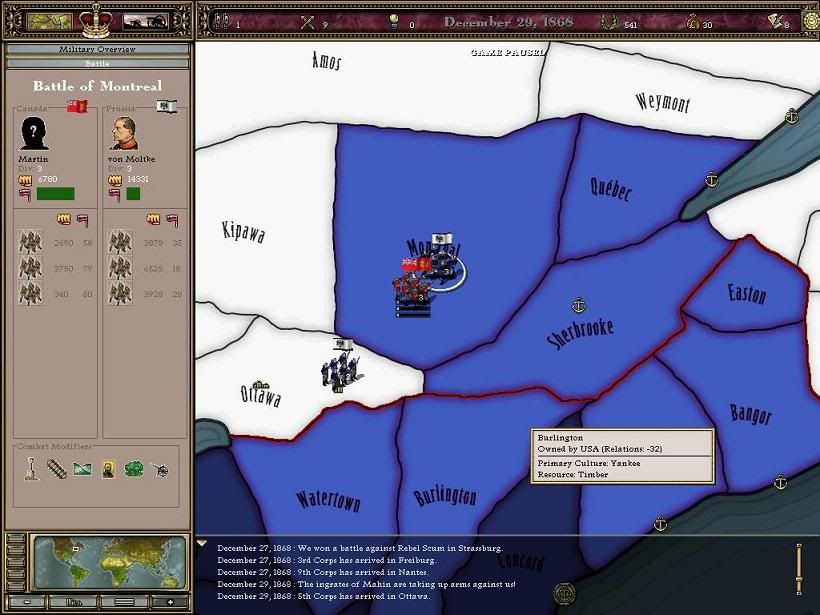
Once victorious against Canadian forces in Montreal, von Moltke again followed his instincts, trusted his subordinates, and pursued not glory but the body of the enemy battle force. While General Denesch secured first Ottawa, and later the Canadian capital of Toronto (in late February 1869), and while new seaborne arrivals captured the island of Newfoundland, (and while, on the western Canadian coast, other Prussian forces captured portions of Alaska) von Moltke harried the remnants of the corps that had attacked him as they retreated into provinces north of Ottawa.
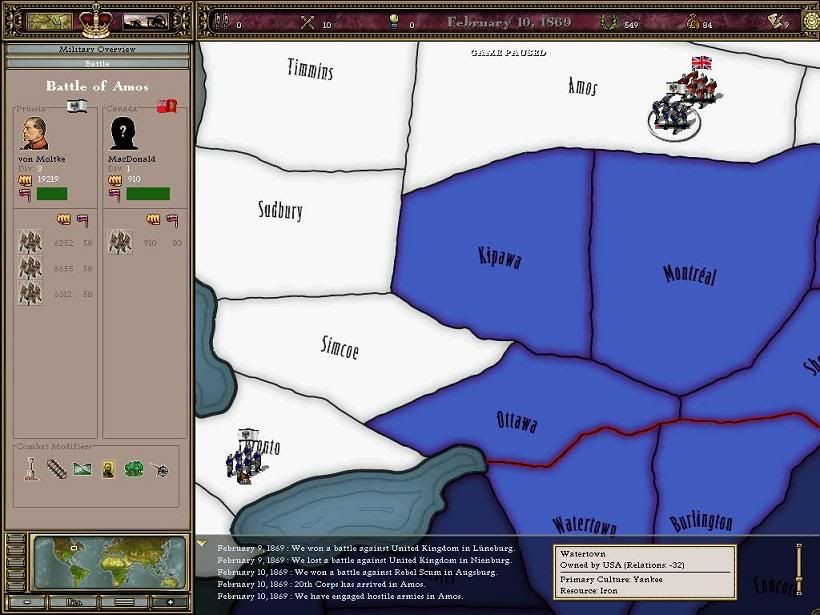
Resolution in Canada seemed to approach with inevitability. Other events, however, moved with yet more determination.
At the beginning of October, 1868, a flurry of confusion confounded Feldmarschall von Moltke’s advance into Ottawa. Officials in the Canadian Colonial Office made an entreaty to von Moltke, suggesting the possibility of a separate peace. The Canadians were considering declaring their independence from Britain – a change of status, not a complete break. But they let it be known to the proper authorities that under the right conditions they might entertain an armistice with Prussia to avoid further conquests on their land.
Intrigued, von Moltke agreed to a temporary cease-fire. Once they entered discussions, it became clear that Prussian and Canadian authorities would not be able to come to a complete agreement. The conditions the Canadians requested were entirely outside of von Moltke’s range of authority, and his best instincts told him that it might not be in Prussia’s best interests to make a separate peace.
In the meantime, during the few days of cease-fire and negotiations, two additional divisions of Canadian militia moved into position near the Prussian positions. Complaints from von Moltke went unheeded, and it remains unclear to this day whether the negotiations were a ruse, or if it was simply a miscommunication that resulted in the breach of the truce. In any case, von Moltke issued an ultimatum to the Canadians, and resumed hostilities a day afterward.
Canada did declare its independence, and the British Dominion of Canada was established. Combat was re-engaged, and two days of fighting ensued. However, in the time since the cease fire was agreed to, von Moltke had lost valuable advantages. Rather than fight at a disadvantage – he was always a master of maneuver and surprise, not set-piece battles – von Moltke chose to retreat to Montreal. Canadian forces pursued him, and held him at bay in the Montreal area until the end of the year.
However, at about this same time, in the first half of October, Prussian reinforcements from Spain arrived in Canada. Immediately after their delivery, elements of the Royal Navy showed up. These Prussian transports were lost, but more would come. These new divisions, together with forces already operating along the American border, combined to thrust toward Ottawa from the south.

Once victorious against Canadian forces in Montreal, von Moltke again followed his instincts, trusted his subordinates, and pursued not glory but the body of the enemy battle force. While General Denesch secured first Ottawa, and later the Canadian capital of Toronto (in late February 1869), and while new seaborne arrivals captured the island of Newfoundland, (and while, on the western Canadian coast, other Prussian forces captured portions of Alaska) von Moltke harried the remnants of the corps that had attacked him as they retreated into provinces north of Ottawa.

Resolution in Canada seemed to approach with inevitability. Other events, however, moved with yet more determination.
regarding war score, would capture of Canada's capital compensate for the (possible) capture of Berlin? :wacko: btw, what is your war score?Rensslaer said:Resolution in Canada seemed to approach with inevitability.
nice update!
I go away for acouple of days and then come back to read all this? OUTSTANDING!! 
So, what's the Kaiser doing about the British march toward Berlin?
So, what's the Kaiser doing about the British march toward Berlin?
very nice AAR, finally gotten around to getting the game myself after a few years of HOI, HOIII and EUII.
and now i trust that the Prussian boys will show those limpid tea sipping, crumpet eating brits that the power of pilsner and sauerkraut is allways the greatest.
and now i trust that the Prussian boys will show those limpid tea sipping, crumpet eating brits that the power of pilsner and sauerkraut is allways the greatest.
Well, the Kaiser will order an all-out defense, no retreat, throw them back, all that sort of drill... Rensslaer will tell the world there is no threat to Berlin... The British aren't even near Berlin. In fact, there are no British troops anywhere in the hemisphere! We swear it!Draco Rexus said:I go away for acouple of days and then come back to read all this? OUTSTANDING!!
So, what's the Kaiser doing about the British march toward Berlin?
These aren't the 'droids you're looking for! :rofl:
Good to see you back, Draco!
Rey & Anonymous, thank you for your encouragement!
Ghostwriter, as I recall, my warscore was a positive low-twenties through most of 1868, gradually rising as we effected our control in China, Africa and Canada.
To my newer readers -- Mike von Bek, BBBD, Osloweasel -- welcome! Osloweasel, glad you're trying the game!
Thank you very much for stopping by and commenting! I appreciate your attention and interest.

